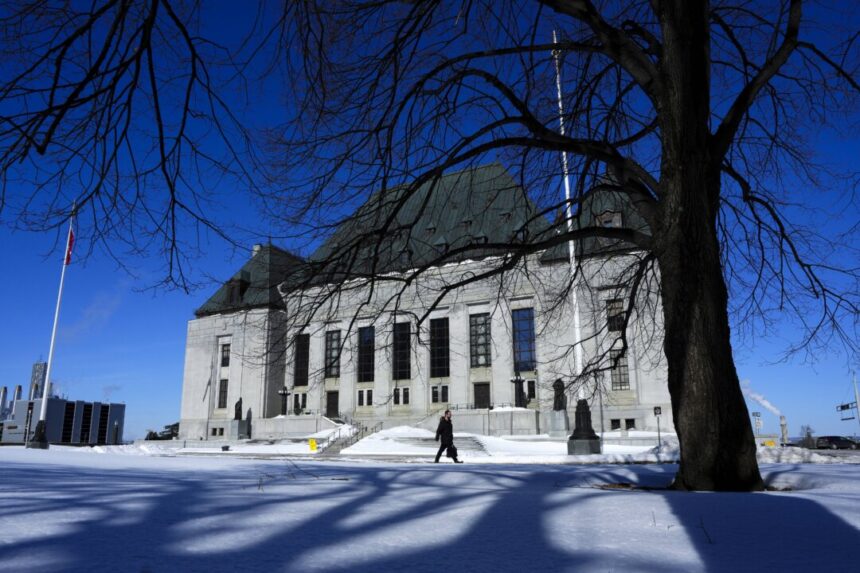The Supreme Court of Canada will consider this week whether COVID-19 travel restrictions that prevented a woman from attending her mother’s funeral in 2020 violated her mobility rights under the Charter.
Kimberley Taylor, a Canadian originally from Newfoundland and Labrador currently living in Nova Scotia, filed an application on May 20, 2020, to contest the constitutionality of Newfoundland’s COVID-19 travel restrictions after she was denied entry to the province to attend the funeral of her mother, who had died suddenly at her home in St. John’s.
Taylor is listed as the applicant, along with the Canadian Civil Liberties Association (CCLA). The case names the province of Newfoundland and Labrador and Chief Medical Officer of Health Janice Fitzgerald as respondents.
Supreme Court of Newfoundland and Labrador Justice Donald H. Burrage ruled on Sept. 17, 2020, that while Taylor’s right to mobility was infringed, the violation was justified under the Charter’s “reasonable limits” clause due to the pandemic.
“Ms. Taylor’s s. 6(1) Charter right to mobility was infringed, albeit fleetingly, when she was denied entry into the province. Ms. Taylor’s s. 7 right to liberty was not engaged,” wrote Burrage.
“The infringement of Ms. Taylor’s right to mobility was demonstrably justified under s. 1 of the Charter in response to the COVID-19 pandemic.”
The judge also said the province was acting within its legislative authority when implementing travel restrictions under the Public Health Protection and Promotion Act. The applicants had argued the provision under which the province adopted the measures intruded “into federal jurisdiction over interprovincial works and undertakings.”
Now both the applicants and the respondents are seeking permission from the Supreme Court of Canada to appeal Burrage’s decision, although on different grounds. The Supreme Court is set to evaluate the application for permission to appeal on April 15 and 16.
Several parties have applied for intervener status, including the attorney generals of Canada, Nova Scotia, New Brunswick, Prince Edward Island, Saskatchewan, Yukon, and Nunavut. The British Columbia Civil Liberties Association, and the Canadian Constitution Foundation are also listed as interveners.
Applicants’ Position on Appeal
Taylor and the CCLA say they want the court to assess whether Burrage’s interpretation of section 6 of the Charter on mobility rights is accurate.
In his decision, the judge ruled that Taylor’s mobility rights were infringed according to provision 6(1), which says that “every citizen of Canada has the right to enter, remain in and leave Canada.”
Meanwhile, Burrage concluded her rights were not violated under section 6(2) (a) of the Charter, which says citizens and permanent residents have the right “to move to and take up residence in any province.” He argued that this provision applies only to those relocating to another province, not to travel for other reasons such as visiting, as in Taylor’s case.
“I interpret the language ‘to move to’ as conjunctive with the taking up residence in any province, such that the right as defined is singular, the right to move to and take up residence,” wrote Burrage.
“Does such an interpretation mean that the language ‘to move to’ is superfluous, such that s. 6(2)(a) might simply read as the right to ‘take up residence’ in any province? I do not think so, for the right is a mobility right, not a static right of residence.”
He then interpreted “the right to move to and take up residence as the right to live anywhere in Canada and to move freely about the country for that purpose,” subject to the limitations set out in the Charter, such as laws.
Taylor and the CCLA say the case should be heard and that it is of public importance, because it may determine whether the Charter protects the right to interprovincial travel unconditionally. They argue the judge interpreted section 6(2) (a) “narrowly,” limiting it to moving to another province to establish residence, rather than to interprovincial travel more generally.
The Supreme Court of Canada only accepts appeals in cases deemed to involve issues of “public significance,” including the interpretation of the Constitution or constitutional rights.
Respondents’ Position on Appeal
The Province of Newfoundland and Labrador and its chief medical officer of health want to appeal the judge’s decision that Taylor’s right to mobility was infringed under section 6(1), arguing that this provision only applies to international movement, not interprovincial.
They say they agree with the judge’s interpretation that section 6(2)(a) only applies to permanent movement to take up residence, not a general right to travel within Canada.
“No court in Canada has ever determined that section 6(1) provides a right of mobility [unconditionally],” the respondents wrote, adding that the judge’s decision “significantly expands the ambit of this right.”
The province and Fitzgerald argue the decision would make Newfoundland and Labrador “the only province in Canada in which citizens have an express constitutional right of entry.”
They further argue that the determination regarding the infringement of Taylor’s mobility rights, along with the assertion that the Charter safeguards interprovincial movement, indirectly limits the statutory authority of the chief medical officer of health (CMOH).
“Jurisprudence that limits or fetters the CMOH’s powers to manage a pandemic is of critical public importance,” the respondents wrote. “It is the very reason why the CMOH joined with the Applicants in pressing to have the Court of Appeal hear this case.”












